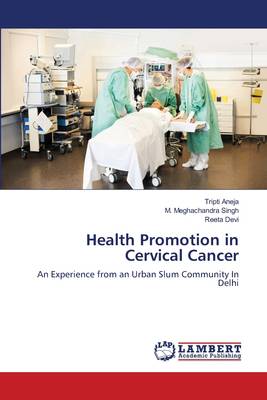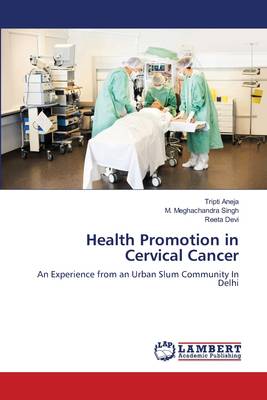
- Afhalen na 1 uur in een winkel met voorraad
- Gratis thuislevering in België vanaf € 30
- Ruim aanbod met 7 miljoen producten
- Afhalen na 1 uur in een winkel met voorraad
- Gratis thuislevering in België vanaf € 30
- Ruim aanbod met 7 miljoen producten
Zoeken
Health Promotion in Cervical Cancer
An Experience from an Urban Slum Community In Delhi
Tripti Aneja, M. Meghachandra Singh, Reeta Devi
Paperback | Engels
€ 53,95
+ 107 punten
Omschrijving
Cervical cancer is the second most common type of cancer affecting women globally and claimed over 275,000 deaths in 2008, approximately 88% of which occurred in developing countries. In India it is the one of the leading cancer among women. Ignorance, illiteracy, misconceptions, and indifferent attitudes towards health care system are the barriers in screening of cervical cancer in India. Cervical cancer is the only one that is almost totally preventable by the detection through regular screening and treatment of its pre-cancerous lesions. Every woman should be screened at every opportunity of contact with a health professional, at first ante-natal clinic visit, family planning, sexually transmitted infections and gynecological clinics. The present study observed that small group discussions with women are effective in disseminating the awareness about cervical cancer and need for early detection in an urban slum community of Delhi. The findings would be useful for health care workers, academicians, social scientists, public health specialists and non-governmental organizations in implementing programmes for cervical cancer screening.
Specificaties
Betrokkenen
- Auteur(s):
- Uitgeverij:
Inhoud
- Aantal bladzijden:
- 96
- Taal:
- Engels
Eigenschappen
- Productcode (EAN):
- 9783659478840
- Verschijningsdatum:
- 8/10/2013
- Uitvoering:
- Paperback
- Afmetingen:
- 150 mm x 220 mm
- Gewicht:
- 150 g

Alleen bij Standaard Boekhandel
+ 107 punten op je klantenkaart van Standaard Boekhandel
Beoordelingen
We publiceren alleen reviews die voldoen aan de voorwaarden voor reviews. Bekijk onze voorwaarden voor reviews.







